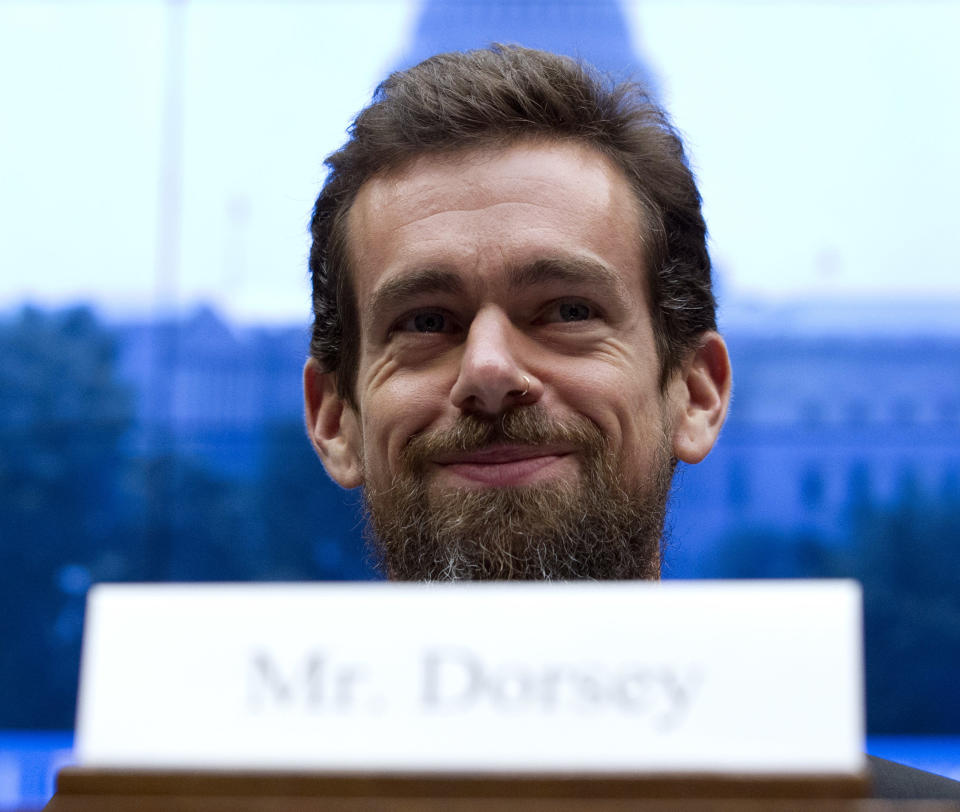Twitter banning political ads could look very smart come 2021
Twitter CEO Jack Dorsey chose 4:05 p.m. EST on Wednesday, just after market close and at the very same moment Facebook earnings were released, to make a surprise announcement that will have major implications for Twitter (TWTR). The company will immediately “stop all political advertising on Twitter globally,” Dorsey said in a tweet-storm.
He laid out his reasoning in 10 more tweets, the most direct of which goes straight for Facebook (FB) and its CEO Mark Zuckerberg: “It’s not credible for us to say: ‘We’re working hard to stop people from gaming our systems to spread misleading info, buuut if someone pays us to target and force people to see their political ad…well...they can say whatever they want!’”
Dorsey is summing up what Facebook’s stance has been on political ads on its site, a stance it has stuck with amid a torrent of criticism from tech media and lawmakers in the last few weeks.
For instance, it‘s not credible for us to say: “We’re working hard to stop people from gaming our systems to spread misleading info, buuut if someone pays us to target and force people to see their political ad…well...they can say whatever they want! 😉”
— jack 🌍🌏🌎 (@jack) October 30, 2019
Removing itself from the Washington tech backlash
But Dorsey and Twitter are not just scoring points here against Zuckerberg and Facebook. The company is also attempting to remove itself from the larger discussion, and regulatory scrutiny, around tech companies policing false information on their platforms.
Twitter stock fell nearly 2% after-hours following Dorsey’s announcement, which makes sense: shareholders are obviously thinking about the ad revenue that will be lost for the company.
But by 2021, this moment, in hindsight, could look like a bold business risk that paid off.
By banning political advertising on Twitter, Dorsey is betting that come 2021, he and other Twitter executives won’t be testifying on Capitol Hill about yet another cycle of false campaign information that influenced a presidential election.
Following in the footsteps of Dick’s and Nike
In a way, Twitter’s move is not unlike recent decisions made by Dick’s Sporting Goods or Nike.
When Dick’s (DKS) last year removed assault rifles from its stores and raised its age for gun buyers to 21, the move did not go over well with conservatives, and some threatened to boycott the sporting goods chain. The stock took a hit in the short-term as well. But Dick’s CEO Ed Stack told Yahoo Finance that the shooting at Marjory Stoneman Douglas High School in Parkland, Fla., was a tipping point for him personally and for the company’s values: “When we heard the students’ rallying cry, ‘enough is enough,’ it really got to us. We felt like we had to take a stand.” Dick’s stock has rallied 25% in 2019.

Similarly, Nike (NKE) took a political risk one year ago when it launched a new ad campaign around Colin Kaepernick, the former NFL quarterback who became a lightning rod after he began kneeling during the national anthem to bring awareness to police brutality. Nike, like Dick’s, faced some blowback on social media and boycott threats, but the ad campaign actually led to a spike in foot traffic to stores. Nike shares are up 22% this year.
Of course, Twitter’s move is by no means a purely values-driven step to heroically fight misleading political ads. It is a calculated business effort to take aim at a much larger competitor. And Twitter has not yet given specific guidelines on exactly what constitutes a political ad.
Twitter had $702 million in ad revenue in the third quarter of this year, and $2.6 billion in total ad revenue in 2018. Twitter CFO Ned Segal tweeted on Wednesday that Twitter brought in less than $3 million from political ads during 2018 midterm elections. (On Facebook’s earnings call on Wednesday, Mark Zuckerberg estimated that political advertising will make up less than 1% of Facebook’s 2020 revenue.)
Since we are getting questions: This decision was based on principle, not money. As context, we’ve disclosed that political ad spend for the 2018 US midterms was <$3M. There is no change to our Q4 guidance. I am proud to work @twitter! #LoveWhereYouWork https://t.co/U9I0o1woev
— Ned Segal (@nedsegal) October 30, 2019
But it could also prove to be successful at removing the company entirely from names like Facebook, Google, and Amazon — companies that now carry negative associations in Washington as big bad tech giants with too much power and influence over what content people see and believe.
Twitter would like to remove itself from that conversation entirely, and eliminating political ads will help that happen.
—
Daniel Roberts is a senior writer and live show host at Yahoo Finance, and closely covers tech. Follow him on Twitter at @readDanwrite.
Read more:
Twitter CEO Jack Dorsey’s personal account gets hacked
Jack Dorsey’s love of bitcoin could be a problem for Square
How Eventbrite's horrible stock performance has hurt Square
Can Jack Dorsey keep running two public companies?
Facebook's crypto plans in jeopardy as big-name Libra Association 'founding members' drop out
Libra coin backlash: What 'founding members' besides Facebook say
Square is Yahoo Finance’s 2018 Company of the Year
Read the latest financial and business news from Yahoo Finance
Follow Yahoo Finance on Twitter, Facebook, Instagram, Flipboard, LinkedIn, YouTube, and reddit.
